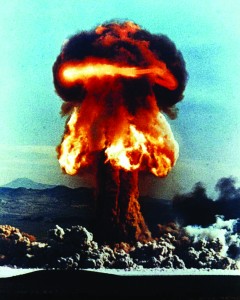Radiation is scary. Unrelenting and invisible, it calls to mind visions of flattened cities, nuclear firestorms, and grisly cancers. Many see it as a modern-day Frankenstein’s monster – science and technology gone horribly awry.
Nuclear Nightmares, a documentary produced for BBC’s Horizon program, dares us to grapple with our fear of radiation. In less than one hour, the film covers impressive ground, both offering an understanding of why we fear radiation and proposing that we might not need to be so afraid. This conclusion might be hard to believe before viewing the documentary, but it is delivered skillfully, convincingly, and with the full force of evidence, making Nuclear Nightmares an entertaining and enlightening film.

The documentary first traces the dynamic relationship between humanity and all things radioactive. Early opinions of radiation were much rosier than our modern conceptions. Radium was once an emblem of quality, beloved by marketers and prized by consumers. It was not until the atomic bombings of Japan during the Second World War that radioactivity acquired the sinister guise it still wears today.
The danger of nuclear weapons is of course indisputable. However, the same danger does not necessarily apply to much smaller doses of radiation, and it is here that popular opinion and scientific opinion diverge. At this junction, Nuclear Nightmares plunges into the muddle, arguing that our fear of radiation is overblown – a sort of “radiophobia” unfounded by the facts.
The filmmakers are also wisely low-key in their presentation of these facts. The documentary juxtaposes conventional, dramatic nuclear narratives with scientific data that tells an entirely different story. The dissonance leads inexorably to the conclusion that radiation might not be the terror we assume it to be.
It is this ability to marshal clear reasoning and empirical results that distinguishes Nuclear Nightmares from other scientific documentaries. The producers are refreshingly unafraid to delve into scientific details to make a more cogent argument for the facts. For example, the film includes evidence from the aftermath of Chernobyl that low doses of radiation might actually help prevent cancer.
Nuclear Nightmares systematically challenges the special status we confer on radioactivity via its artistic and compelling delivery. In the process of watching the documentary, we are reminded that radiation is not uniquely the product of human folly, but is “everywhere, in everything we drink, breathe, and eat…It’s just part of life.”
Rating: 4/5
